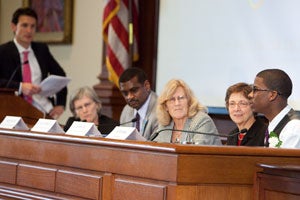Children in foster care experience daunting challenges of stability and security in the school system, according to participants in the program “On the Road to Educational Equality,” held at Harvard Law School on May 24.
Organized by Fostering Media Connections in collaboration with the Harvard Law School Child Advocacy Program, the town hall event featured a panel of experts in the child welfare field and a former foster child as well as, via satellite, U.S. senators Mary Landrieu and Chuck Grassley, who co-chair the Senate Caucus on Foster Youth. Daniel Heimpel, project director of Fostering Media Connections, served as moderator. HLS Dean Martha Minow, whose own work has focused on advocacy for children and education, gave introductory remarks. “To have the chance to hear from leading national decision makers makes this a very special occasion,” she said.
View a video of the event.
Providing perspective on the issue, graduating HLS student Leah Watson ’11 offered stark statistics regarding children in foster care, showing they lag behind their peers on every measure of educational opportunity. These numbers include a 23 percent dropout rate compared with 9 percent of the general student population, half in special education compared with 12 percent, and 52 percent reading below grade level compared with 38 percent. In addition, only 3 percent of foster children obtain a bachelor’s degree. Because of the lack of educational attainment, she said, “These students are really struggling with the ability to earn a living wage” when they grow up.
This disturbing outcome, many panelists said, can be traced to the lack of permanency for foster children, which causes them to frequently switch schools. Addressing the students in the audience, Landrieu said: “If you had to go to 10 different high schools, you probably wouldn’t be at Harvard today.” Added Grassley: “We need permanence for these kids. That comes best through adoption. But short of adoption, that means stability.”
Angelo McClain, commissioner of the Massachusetts Department of Children and Families, said the agency’s most important goal is improving the placement and educational stability of foster children. He pointed to the difficulty of securing transportation for foster children to attend a preferred school (the proposed federal Fostering Success in Education Act would require keeping foster children in their current schools after they move to new school districts if it is in their best interest). He also cited the importance of integrating foster children into new school environments and addressing issues of trauma. For example, foster children would benefit from having a social worker placed in schools to address behavioral social issues, according to McClain.
Susan Cole, director of the Trauma and Learning Policy Initiative, a collaboration between Harvard Law School and Massachusetts Advocates for Children, noted that many children in foster care report that they don’t feel welcomed in schools. She called for an “organizational change effort” that is “trauma sensitive” so that children in foster care can thrive in school.
“Schools have got to create safe environments with embedded services,” she said. “It requires a whole infrastructure in school to make this happen.”
Gail Garinger ’72, a former juvenile court judge appointed Child Advocate for the Commonwealth of Massachusetts, said schools emphasize standardized test scores but also need to support vulnerable students in order to facilitate educational achievement. “We have to convince people that that would lead to better learning and better success in schools.”
McClain touted the Foster Child Tuition and Fee Waiver Program, which provides free undergraduate tuition and fees to foster children to attend state higher education. It’s important, he said, to believe that foster children can achieve that standard. “Sometimes they can live up or down to the expectations we have of them,” said McClain.
Nineteen-year-old Sixto Cancel of Bridgeport, Conn., who entered into foster care at age 11 months, said that he was inspired to create a support program after seeing foster children return from college having failed or been kicked out. First offering SAT preparation, the program eventually developed into a remedial program to raise students to grade level. “We didn’t realize how far kids were behind,” he said.
During an audience commentary session following the panel discussion, several people who experienced the foster care system detailed the difficulties they were forced to overcome, including living in multiple group homes and facing violent surroundings. In response, Cancel said: “I understood at an early age that the only way out was through education. Once I realized that, everything changed.”
In concluding remarks, actress, activist, and former foster child Victoria Rowell emphasized the importance of the arts as well as strong mentors for foster children.
In partnership with Participant Media (the production company responsible for films like “Inconvenient Truth” and “The Kite Runner”), event organizers also featured clips of “Waiting for Superman,” a documentary on America’s failing schools featuring Geoffrey Canada, head of the Harlem’s Children Zone and a graduate of Harvard’s School of Education.
